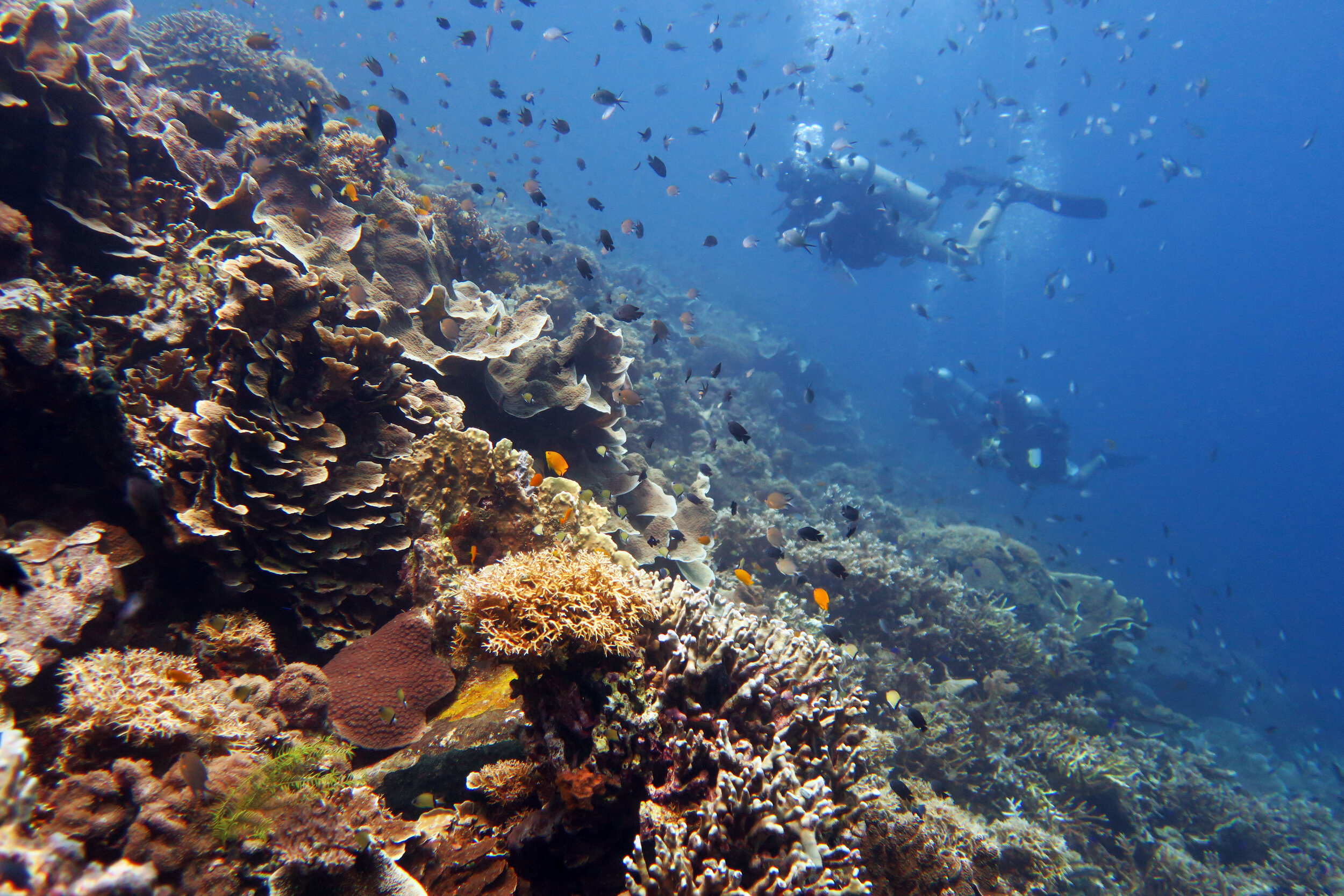Coral Conservation from the Bottom Up
Josh Pysanczyn
Established in 1986, Coral Cay Conservation is an internationally awarded organisation providing environmental conservation for coral reefs and their associated systems. The company takes pride in its bottom-up, ecosystem-based approach, working directly with local communities, resource managers and government agencies to achieve their mission.
Volunteer Coordinator Tessa Dawson tells us a bit more about the work they undertake at Coral Cay Conservation and how you can get involved!
Working with local communities, Coral Cay Conservation works from the bottom up. Photo: Tessa Dawson.
Hey Tessa! Tell us a bit about yourself and your role within Coral Cay Conservation?
I have been with Coral Cay Conservation (CCC) for five years now! I studied Animal Behaviour at university and once graduated, spent a number of years undertaking terrestrial field data collection. I then moved into more Communications and Operations-based internship roles, including a period with CCC as an Operations Intern.
In 2014, my internship supervisor at CCC moved on and I took the role of Volunteer Coordinator. This involves recruitment and administration of the volunteers and staff, managing site operational and budget administration, contributing to social media and providing assistance to our Head of Science and Head of Operations. At the heart of my role is customer care but the scientific atmosphere makes for a really interesting workplace, and I enjoy helping people to complete their travel and training goals.
How do you hope your outreach work will influence others?
For me it’s always been about changing people’s understanding of their impact on the environment. Our work is focused on the creation and assessment of Marine Protected Areas (MPAs) through resource appraisal, education and capacity building, and at the heart of this is the sustainable use of marine resources. Through our outreach work we can extend our influence much farther afield; raising awareness, building social responsibility and inspiring the next generation of environmental stewards.
Our Scholarship Programme, where we accept one local Filipina a month and take them through our Skills Development Programme for free, has been a vital part of this, offering local community members the opportunity to receive training in PADI SCUBA, marine ecological data collection techniques and species identification. This will ensure that when we eventually come to move on, we have created a cohort within the local communities that are then able to continue the essential work.
Outside of this there are changes that we all must take to reduce our impact on our oceans, such as pollution reduction through reducing the purchase of virgin plastics, reusing where ever possible and of course – recycling!
I’m a firm believer that we can all make a difference, and through our work we try to create conservation advocates!
Can you tell us about the current projects / research run by Coral Cay Conservation?
We are currently based in the Philippines undertaking the Southern Leyte Coral Reef Conservation Project (LRCP). The Philippines lie at the heart of the Coral Triangle, a region of the Indo-Pacific celebrated as the most biodiverse marine ecosystem on the planet. Despite this, the Philippines is subject to a number of impacts from unsustainable fishing to climate change, which threatens the health of the reefs. In an effort to combat these threats, the LRCP was founded in 2002 to secure the long-term benefits and services of coral reefs and associated systems, protecting food security and supporting livelihoods of the residents in the Southern Leyte province.
At the heart of the coral triangle lies the Philippines. Photo: Tessa Dawson.
Since 2002, we have completed a series of mapping projects, developing our understanding of the ecological status of the reefs of Southern Leyte. These findings highlighted the need for further protection efforts in the region. Building on this, we undertook data collection at a higher resolution to allow the establishment of small scale marine protection. Alongside this outreach, efforts were ramped up, with educational efforts focused on schools, local community training and the introduction of the Scholarship Programme. We are currently working on the next phase, evaluating the effectiveness of previously established MPAs.
Alongside the aforementioned outreach efforts, this multi-pronged approach allows us to effectively work with local communities to achieve the aims set out for the LRCP.
How does Coral Cay Conservation work with local communities?
Capacity building is a large part of our work in the Philippines, this ensures that when we eventually move on, the local community can continue the work and manage their natural resources autonomously. A very successful undertaking for this is the Scholarship Programme. Since 2013 we have welcomed 95 scholars, some of whom have gone on to create their own green organisations, facilitate local governments in conservation-actions or work in related fields. Our Project Scientist is responsible for managing the in-country data collection and working with our in-country partners and stakeholders.
Our work with the Provincial Environment and Natural Resource Management Office (PENRMO) means they are often invited to speak at larger conferences and workshops. This means that we are able to speak directly with the decision makers and resource managers in government and disseminate our work. A successful MPA depends on the full support and compliance of local stakeholders, so it’s really important that we ensure that they are included throughout the MPA establishment process.
When we are first invited to visit a ‘barangay’ (local village), we hold a community day which is an opportunity for us to discuss the importance of coral reefs and MPAs. On completing our data collection, we then return to the community to present the results and give our management recommendations with regards to an MPA, this offers a chance for us to answer any questions and gain support. Following the assessment of an established MPA we will provide recommendations to the community on how to increase, and maximise, the benefits of the MPA.
Within this time frame we also conduct our outreach programmes with local children; Reef Rangers and Seastars. These two programmes are all about raising awareness for the local reefs within the younger generation, through engaging presentations and games. Reef Rangers students also get the opportunity to visit our project site and snorkel on our house reef. As this is one of the top dive sites in the area - boasting around 45-50% diverse coral cover - it’s a fantastic tool for us to build appreciation of the underwater world!
What volunteering opportunities does Coral Cay Conservation offer for inspiring marine conservationists?
Unfortunately, our project in the Philippines is still closed due to various national and international travel restrictions. However, we are using this opportunity to reinvigorate the project, our scientific processes and the overall volunteer experience, and are looking forward to sharing our vision with the public soon. If you would like to receive updates about the project, and when we expect to reopen make sure to sign up to our mailing list. Once we reopen, there are several ways in which to join us, either as a volunteer, staff member or intern:
Volunteer
Our international volunteers collect the data that we use to establish and measure the success of MPAs, so their role is absolutely vital! As no prior marine biology or dive experience is required, there really is no such thing as a ‘typical volunteer’. On the one side, we welcome many budding marine conservationists who wish to build their field experience skills, and budding professional divers who want to supplement their teaching skills with species ID knowledge. However, we also welcome many volunteers who are entirely new to diving and/or marine biology, who want to learn how to dive with an ethical organisation or work on the frontline of conservation.
Each volunteer is trained up to PADI Advanced Open Water as standard, but for those that join us for longer periods Rescue and Divemaster courses are available. Next comes the in-depth Skills Development Programme which introduces them to marine ecology and gives them the skills needed to collect marine ecological data. The Philippines is a marine biodiversity hotspot, so it’s a beautiful place to learn! Once trained, alongside data collection, volunteers can assist with our outreach efforts, helping to educate the local children and for some, accompanying them on their first sighting of a coral reef!
We also regularly support and facilitate independent BSc and MSc researchers who utilise our approach to support their dissertations and further studies; collecting their own data or utilising our extensive historic database.
Data collection by volunteers is absolutely vital. Photo: Tessa Dawson.
Staff
We have a number of roles on our project site focused on science, field base management or SCUBA instructing. These offer an opportunity for graduates to gain hands-on experience in a range of skills including project management, data collection, teaching, and tropical species ID. We pride ourselves on providing a critical stepping stone for young, budding marine biologists and conservationists alike, giving them the necessary skills and tools to allow them to succeed in their chosen career. Many ex CCC staff members and volunteers have gone on to great success and are now accomplished scientists in their field, we are very lucky to be able to benefit from their experience as several of them form a part of our Scientific Advisory Committee.
Divemaster and Conservation Internship
Although we do train up to Divemaster on our site we also offer an alternative internship. With 10 weeks on our site, followed by 10 weeks with a commercial dive shop, we have designed this internship to ensure the dive student gains an appreciation of marine biology and conservation, in addition to the commercial experience which will help to build their professional diving CV.
Marine Expedition Management Scheme
This is a highly specialised tailored 6-month internship. With training in the UK, followed by 5 months based on a CCC expedition site shadowing our staff team. This internship has been designed to take the intern through all the training required to become a Field Base Manager.
Coral Cay Conservation opportunities offer a range of skills including project management, data collection, teaching, and tropical species ID. Photo: Tessa Dawson.
Lastly, what do you hope the future will bring for our oceans?
My hope isn’t exactly a small one. If we are going to save our oceans, we need to tackle climate change and pollution on a global level. With TV programmes like Blue Planet becoming so popular, there’s never been a better time to garner interest in the health of our oceans. At the very least, I would hope that individuals make changes to the way they live their lives to reduce their impact on the environment. However, it needs to go much further than that. Industry needs to be willing to switch their materials and production protocols to environmentally friendly alternatives, and governments need to start issuing legislation, rather than just recommendations.
If you’ve enjoyed this interview with Tessa Dawson, you can follow her here @coral_cay_conservation
Want to be interviewed for us? Check out our ‘Get Involved’ section
Blue Missions showcases the work of marine organisations dedicated to protecting our oceans.
If you’ve enjoyed reading this interview look out for more Blue Missions blogs from Josh Pysanczyn and follow him here @wild_____life and visit his website.




